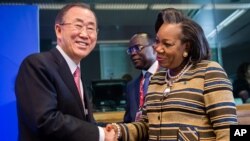African and European leaders are focusing on the Central African Republic (CAR) crisis at a summit in Brussels.
During a news conference, U.N. Secretary-General Ban Ki-moon said he would press world powers to provide more security and financial support to the CAR. "The people of Central African Republic are suffering grave, deplorable atrocities. I will do everything possible to improve the international response," he said.
Ban said the international community has not made the difference that it promised it would make in the troubled country. He said African and French peacekeepers there are "under-resourced and overwhelmed."
He also said the Central African Republic needs an "inclusive political process" and money so the government can get local police and security officials back on the job.
Leaders from 70 African and European nations are attending the summit, which is taking place as the European Union officially launches a military operation in the Central African Republic.
The European Union has agreed to deploy a temporary force of up to 1,000 troops to the troubled region. They will join about 6,000 African Union and 2,000 French troops that have been trying to protect civilians and disarm militias.
The foreign peacekeepers are currently focused on protecting Muslims who are being attacked by mostly Christian anti-balaka militants.
Tens of thousands of Muslims have fled their homes in recent months, with many taking refuge in neighboring countries.
The anti-balaka militia formed last year in response to a wave of killings and looting by mostly Muslim Seleka rebels.
Human Rights Watch said it has uncovered evidence of massacres, in remote C.A.R.villages, that were carried out by both Seleka and anti-balaka militants.
The group says militants killed 72 Muslim men and boys during February attacks in the village of Guen.
It says, during the same month, Seleka fighters and Peuhl cattle herders carried out a separate attack in a village about 30 kilometers from Guen. The attack left 19 people dead, along with two anti-balaka fighters
During a news conference, U.N. Secretary-General Ban Ki-moon said he would press world powers to provide more security and financial support to the CAR. "The people of Central African Republic are suffering grave, deplorable atrocities. I will do everything possible to improve the international response," he said.
Ban said the international community has not made the difference that it promised it would make in the troubled country. He said African and French peacekeepers there are "under-resourced and overwhelmed."
He also said the Central African Republic needs an "inclusive political process" and money so the government can get local police and security officials back on the job.
Leaders from 70 African and European nations are attending the summit, which is taking place as the European Union officially launches a military operation in the Central African Republic.
The European Union has agreed to deploy a temporary force of up to 1,000 troops to the troubled region. They will join about 6,000 African Union and 2,000 French troops that have been trying to protect civilians and disarm militias.
The foreign peacekeepers are currently focused on protecting Muslims who are being attacked by mostly Christian anti-balaka militants.
Tens of thousands of Muslims have fled their homes in recent months, with many taking refuge in neighboring countries.
The anti-balaka militia formed last year in response to a wave of killings and looting by mostly Muslim Seleka rebels.
Human Rights Watch said it has uncovered evidence of massacres, in remote C.A.R.villages, that were carried out by both Seleka and anti-balaka militants.
The group says militants killed 72 Muslim men and boys during February attacks in the village of Guen.
It says, during the same month, Seleka fighters and Peuhl cattle herders carried out a separate attack in a village about 30 kilometers from Guen. The attack left 19 people dead, along with two anti-balaka fighters













